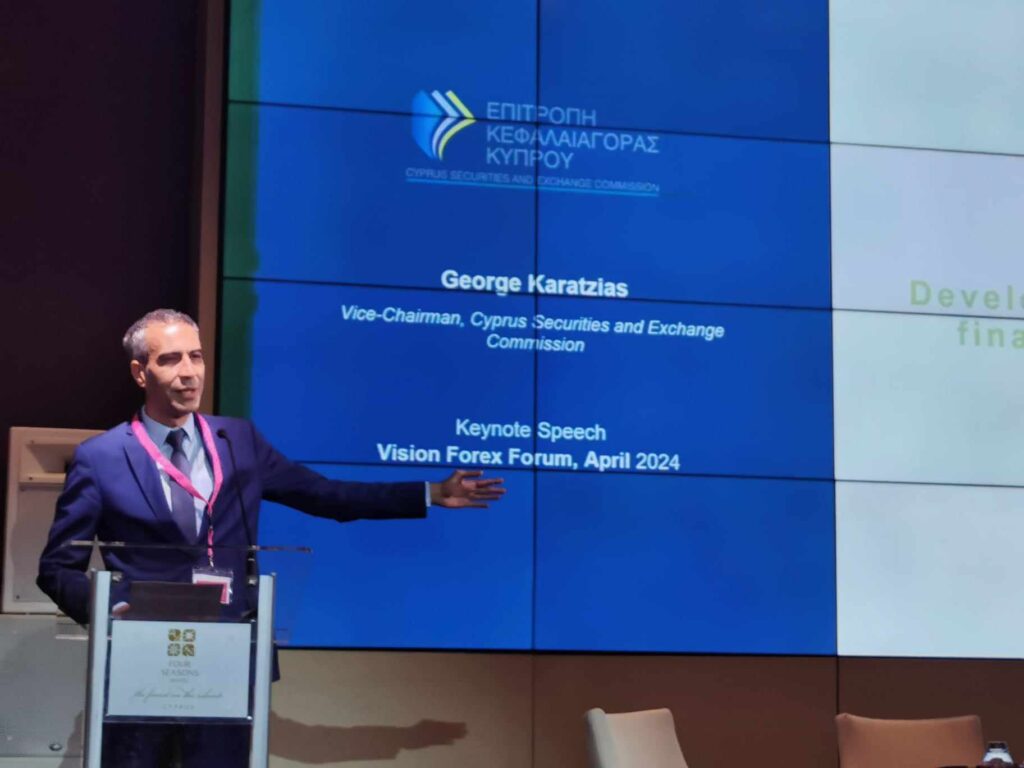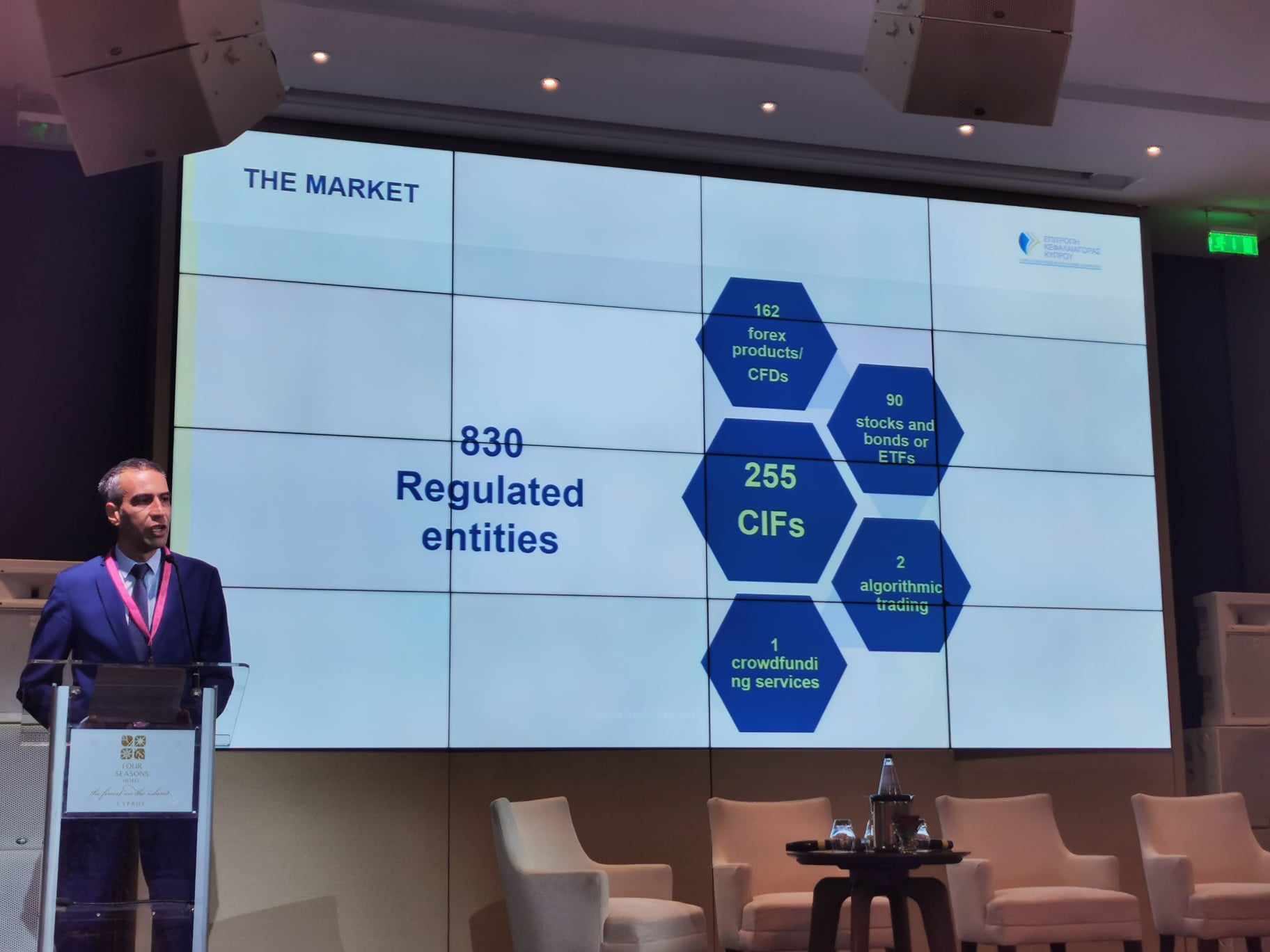The luxurious Four Season’s Hotel in Limassol played host to this year’s Vision Forex Forum held on April 19. Organised by Qube, the event sees some of the key industry players gather for panels, interesting keynotes and insights from C-suite execs in marketing and sales, risk and compliance, and tech through to CEOs and the Vice Chairman of CySEC.
As an agency specialising in financial services marketing, events like this are key to staying updated on compliance, learning about the latest tech and hearing broker insights. Contentworks Agency Director, Niki, attended the event and is sharing her key takeaways from the day.

Upcoming Regulatory Changes
The day kicked off with a keynote from George Karatzias, CySEC Vice Chairman, who covered some of the key regulatory changes coming up for the industry. As content creators for the industry, we keep on top of compliance and regulatory updates and produce a monthly roundup that you can read about here. Below are some of the upcoming changes that Mr. Karatzias covered in his presentation.

MiCA
In January 2024, ESMA and the European Banking Authority announced that crypto companies based outside the EU will be able to serve customers directly within the bloc only under a set of limited conditions to prevent unfair competition.
The Regulatory Technical Standards (RTS) draft under MiCA, released in late March 2024, outlines the guidelines for issuers of stablecoins for dealing with complaints regarding stablecoins that reference multiple assets or currencies.
ESMA also published a final report and its third consultation package regarding further guidelines and rules under MiCA in March.
DORA
The provisions under DORA are set to be fully implemented by January 17, 2025. However, companies need not rush to ensure compliance. The requirements will be enforced in phases, giving businesses time to progressively transition to compliance. The first batch of standards, under the Regulatory Technical Standards (RTS) framework for ICT risk management, was released on January 17, 2024. The second batch, scheduled to be released in June, is expected to include proposed templates and timelines for technical incident reporting, guidelines for estimating losses and costs of cyberattacks, and technical standards for threat-led penetration testing.
The technical standards, however, still require approval from the European Commission.
AML PACKAGE
The European Council and European Parliament reached a “provisional agreement” on some aspects of the European AML package on January 17, 2024. With this agreement, new AML rules are one step closer to being finalised for the EU.
Once the AML package has been finalised, it will need to be approved by the European Parliament and the European Committee of Permanent Representatives. Once it receives these approvals, the AML Package, including the AML Directive and AML Regulation, will come into force in 2027.
With this new set of rules, crypto asset service providers (CASPs) will need to abide by stringent due diligence criteria for the very first time. The January agreement also significantly broadens the definition of an “obliged entity.” Now, businesses operating in the professional football sector and traders of luxury goods (such as yachts, cars, artwork, and precious metals) will also come under the purview of the AML framework. This expansion highlights the EU’s commitment to plugging all possible avenues of money laundering.
MiFIR REVIEW
Amendments to the MiFID II and MiFIR came into force on March 28, 2024, and represent the most significant update since the MiFID II came into force. However, these changes will require additional legislation before they can be adopted EU-wide.
- Firstly, the amendments will need to be translated into national law by EU member nations by a deadline of September 29, 2025.
- Secondly, several revisions to the MiFIR will require new delegated acts and revisions to the current regulatory technical standards (RTS).
The most significant change brought about by the amendments is the establishment of an EU-wide consolidated tape for the bloc’s financial markets. Consolidated tape is a high-speed electronic system that reports the latest price and volume data on transactions. Plus, changes to the region’s market structure have been suggested to increase transparency and competitiveness.
EMIR REFIT
The European Market Infrastructure Regulation (EMIR) REgulatory FITness Program (REFIT) will come into effect on April 29, 2024. It is a significant update to the existing EMIR regulations, comprising changes to the reporting requirements for the derivatives markets. The aim is to improve data quality, transparency, and market stability.
The 3 primary reporting changes include:
- An increase in the number of reportable fields from 129 to 203. In addition, the expected values and definitions of several existing fields will change with the aim of increasing transparency.
- Technical reporting standards will need to comply with the ISO 20022 XML format for data transmission to a trade repository.
- All existing open positions (including those opened before the REFIT was live) need to be transposed to the new standards within 6 months of the go-live date.
To comply with EMIR REFIT, buy-side entities will need to undertake key transformations since legacy systems and the previous reporting framework are unlikely to be compatible with the regulatory changes.
REGULATORY SANDBOX
The European Blockchain Sandbox was established by the European Commission with the aim of facilitating dialogue between regulators and innovators for public and private sector use cases of Distributed Ledger Technologies (DLT). The sandbox has created an EU-wide framework for regulatory dialogue associated with innovative blockchain solutions.
The sandbox provides a confidential and safe platform for regulatory guidance and legal advice for DLT-related innovations, with dialogues expected to be held across geographies and industries. This will help identify and disseminate best practices in the interest of the overall EU blockchain community.
A DAY OF INSIGHTS

The rest of the day continued with panels covering a wide range of topics pertinent to the forex industry including:
- Sustainable growth
- Cybersecurity and combatting financial crime
- Critical AML considerations
- Sales and marketing trends
- The latest forex technology trends
- Digital transformation of KYC onboarding
- Innovations for payments, crypto and the FX sector
- Key trends with Prop Trading – how to build a sustainable approach.
At Contentworks Agency, we deliver compliant content that resonates with your target audience. Book a free Zoom with our team to learn how we can help your finance brand.
